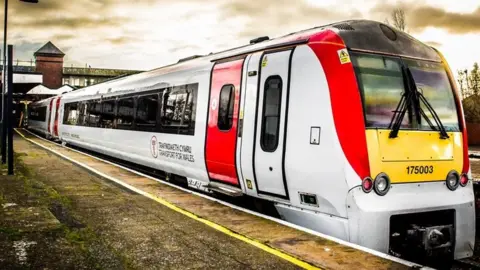'Inadequate' toilet provision on new TfW trains
 TfW
TfWTrains being built for use in Wales will only have one toilet for more than 120 passengers on some routes, a rail passenger group has warned.
Railfuture Wales said the provision was inadequate and could deter some people with health conditions.
They are calling for changes to the design to be made now, allowing one toilet per carriage.
Transport for Wales (TfW) said the level of provision was the same as on new fleets for other rail operators.
The £800m worth of new trains, which comprise 51 two-carriage and 26 three-carriage Civity class 197 units, are being built in Spain and fitted out in Newport. They are due to go into operation in 2022.
The two-carriage trains have seating for 116 people but can carry more standing at busy times.
They will have one accessible toilet between them, while the three-carriage trains will have two.
In a letter to TfW, Railfuture Wales said the trains would provide services for journeys of an average two to three hours, and that the proposed provision would result in people possibly not being able to access a WC when required.
Only the two-car trains can run on the Cambrian Coast Line in Ceredigion and Gwynedd because of the unique signalling system, and the trains are often full in summer.
Peter Kingsbury, chair of Railfuture Wales, wrote: "Previous practice is to have one WC per carriage on medium and long distance services.
"The proposed provision of one WC for two carriages will result in more people not being able to access a WC when required.
"This could result in people with certain health conditions be unwilling to use these services which would be contrary to Welsh Government equality policies."
'Always functioning'
The group is calling for a smaller toilet - not wheelchair accessible - to be put into the second carriage, which they say would made a "significant difference".
Mr Kingsbury said the longer average journey times in Wales meant using the one-toilet provision example in other parts of the UK cited by TfW was "not valid".
In a statement, TfW said it had worked hard to find a balance between seating capacity and the number of toilets.
"We recognise the importance of making sure toilets are always functioning, which is why we have ensured the toilets will be capable of two full days operation," it said.